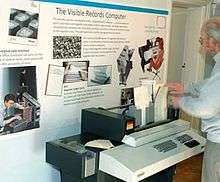The Centre for Computing History
 Display at the museum in 2008 | |
| Established | 2007 |
|---|---|
| Location | Cambridge, Cambridgeshire |
| Type | Computers |
| Director | Jason Fitzpatrick |
| Public transit access | Newmarket Road |
| Nearest car park | On Site |
| Website |
computinghistory |
The Centre for Computing History is a museum in Cambridge, England, established to create a permanent public exhibition telling the story of the Information Age.[1]
The museum acts as a repository for vintage computers and related artefacts. The museum is open Wednesdays through to Sundays from 10am to 5pm. On display are key items from the early era of computers (and even before) from aging comptometers through the Altair 8800 to the Sinclair ZX Spectrum and Apple II series. The museum also holds vintage games consoles, peripherals, software and an extensive collection of computer manuals, magazines and other literature.
History and status
The Centre is a registered educational charity.[2] It is funded by a combination of sponsors from local business, private individuals and local authorities. Venture capitalist and entrepreneur Hermann Hauser was involved with funding discussions.[3] He became patron of the museum in December 2011, 30 years after the launch of the BBC Micro.[4]
Activities
The Centre for Computing History runs regular educational activities for schools and the general public. These range from programming workshops using 1980s BBC Micros to gaming tours to coding using software like Scratch for the Raspberry Pi.
The centre also loans artefacts for film and TV productions and has helped with props and sets for The IT Crowd, Brits Who Made the Modern World[5] on Channel Five with Peter Snow and in April 2009 produced the Gadget Hall of Fame[6] stand at The Gadget Show Live exhibition at the NEC in Birmingham.
The centre collects and preserves historical computing related artefacts and has undertaken a project to preserve the data from the BBC Domesday Project and make it available online. They already have data from both the National Disk and Community Disk online and are currently investigating copyright issues before releasing the URL to the general public.[7]
Move to Cambridge
Plans to relocate the museum to Cambridge,[8] led to a report in October 2011 that negotiations were underway for a site.[3] The museum was informed in June 2012 that planning permission for the new Cambridge site had been granted, subject to complying with current building regulations.[9] The museum moved to a 10,500 sq ft (980 m2) site in Renee Court, Coldham's Road, off Coldham's Lane in the east side of Cambridge in summer 2013.[10] Prior to the move, the museum had been situated in Haverhill, Suffolk.
References
- ↑ "About the Computer Museum". The Centre for Computing History. Retrieved 2009-05-11.
- ↑ Charity Commission. The Centre for Computing History, registered charity no. 1130071.
- 1 2 Vargas, Lautaro (28 October 2011). "Hauser next after museum curator's opportunistic pitch lands US VC". Cambridge Business Media. Retrieved 14 November 2011.
[...] Fitzpatrick says negotiations are now underway on a 10,000 sq ft site on Coldham's Road [...]
- ↑ Walker, Alice (12 December 2011). "Hauser patron of new Centre for Computing History". Business Weekly. Cambridge: Q Communications. Retrieved 13 December 2011.
Dr Hermann Hauser has been named as patron of the new Centre for Computing History in Cambridge UK. [...] agreed to take on the important role 30 years after the company he co-founded – Acorn Computers – unveiled the BBC Micro [...]
- ↑ Brits Who Made The Modern World, episode 3, Computer Games, Five.
- ↑ Gadget Hall of Fame, The Gadget Show Live, NEC, Birmingham, UK.
- ↑ Museum Helps BBC Domesday Reloaded Project
- ↑ "A New Museum for Cambridge". The Centre for Computing History. Retrieved 14 November 2011.
- ↑ Vargas Lautaro (27 June 2012). "Council approves Cambridge computer museum, building regs hold it back". Cabume. Retrieved 29 June 2012.
- ↑ Cambridge News – IT museum in switch to its spiritual home
- News articles
- Inside a museum with byte and big dreams, East Anglian Daily Times, 3 Jun 2008
- Haverhill's Computer Museum to feature on TV, Haverhill-UK, 20 Aug 2008
- Haverhill's Centre for Computing History opens 13 and 14 September, Haverhill-UK, 2 Sep 2008
- Play vintage computer games, Haverhill Echo, 11 Sep 2008
- Museum tells story behind every screen, Cambridge Evening News, 29 Sep 2008
- Museum props up set for hit comedy, Cambridge Evening News, 30 Dec 2008
- Gadget Show Live — Huge success for Haverhill, Haverhill-UK, 23 Apr 2009
- Gadget Hall of Fame: which did you own?, MSN Tech & Gadgets, 28 Apr 2009
- BBC date for computing centre curator, Haverhill Echo, 8 Oct 2009
- Museum-piece computers programmed into TV show, Haverhill Weekly News, 8 Oct 2009
External links
| Wikimedia Commons has media related to The Centre for Computing History. |
Coordinates: 52°12′28″N 0°08′56″E / 52.2079°N 0.1490°E